
City Council knows best?
A pop quiz with no answers … Grand Canyon, brought to you by Shell Oil … And those are quite the hypotheticals.
Pop quiz!
Who is your city council member?
And if you can answer that, please move on to the next question:
Do you know or care what they think?
The landslide defeat of Tucson’s Prop 414 yesterday has us wondering about the political strength and power of persuasion that comes with the title “City Council member.”
The Tucson City Council and mayor had unanimously decided on the plan and asked voters to ratify it, and the local Democratic Party threw its weight into supporting the measure.
A whopping 70% of voters said no.
Prop 414 punctuates a string of recent blocks by the voters against city-council-backed ideas.
The proposed half-cent sales tax, which would have brought in about $80 million per year, mostly for public safety, joins the graveyard of failed city council referrals in recent years that voters have rejected, from Tempe’s proposed deal with the Arizona Coyotes to Tucson’s proposed deal with the local power company a few years back to Mesa’s attempt to hike sales taxes in 2016. Potentially add to that list the Scottsdale City Council’s development deal with Axon, which voters gathered enough signatures to refer to the ballot in November 2026.
We have no real way to quantify whether these high-profile examples that have stuck in our brains represent an upward trend in the number of voter rejections. Nor can we say if they represent a referendum on the city council members themselves or a rejection of the specific proposals.
But it got us thinking…
In a progressive town, Prop 414 had the backing of almost all of its progressive leaders: Mayor Regina Romero and the entire city council, County Attorney Laura Conover, Supervisor Adelita Grijalva, the local Democratic Party, and other establishment influencers.
These are generally popular people in Tucson. In 2023, Romero won reelection with more than 60% of the vote. That year, three of the city council members who supported Prop 414 were reelected by similarly large margins.
Yet their plan to solve the city’s budget woes, Prop 414, went down in flames.
Conservative opposition groups like the Pima County Republican Party, Turning Point USA and others almost never have reasons to celebrate Tucson’s elections.
But on Tuesday night, they were ecstatic.
It was an embarrassing moment for Tucson’s traditional Democratic power brokers.
City council members had made a decent case that they needed Prop 414 to solve the city’s budget woes. And they attempted to build a package that balanced the interests of public safety with community needs — about two-thirds was aimed at public safety, with a heavy emphasis on police amid concerns about local crime. The other third was dedicated to “community projects,” including things like expanding the local homeless shelter.
But instead of uniting constituents concerned with both the effects of homelessness and its root cause, Prop 414 drew a coalition of strange bedfellows. Turning Point USA, the local Republican Party and the local chamber of commerce didn’t like the tax and didn’t trust the council to spend the money appropriately. Meanwhile, Democratic Socialists, the Green Party and mutual aid groups set up a separate anti-campaign, saying they didn’t want more funding for police.
Was it the reliance on the city’s already high sales tax that doomed it? Was it the high spending on police and public safety? The perceived lack of guardrails on other spending?
Or was it a general decline in people’s trust and deference toward their local elected leaders?
Our guess is it’s probably some mix of all of that.
The folks at MAGA-action-group Turning Point USA who campaigned against Prop 414 will tell you it’s because Tucsonans are fed up with the liberal policies of their elected leaders.
But that seems like a stretch, considering they keep electing them in landslides.
At perhaps the saddest-looking election party in recent memory, Romero blamed Prop 414’s failure on Donald Trump’s mass firings of federal employees and the general economic uncertainty sweeping the country. She maintained that the plan addressed the problems voters want Tucson to focus on.
That theory doesn’t pass the smell test either.
It’s clear that their proposal was way off the mark from what most voters wanted, and less clear what Trump had to do with any of it.
Prop 414’s rejection shows that while people may vote for their individual city council member, that doesn't mean they're gonna go along with every idea their politicians come up with.
Grand Canyon Trump Hotel/Theme Park: Environmentalists are worried that the Trump administration will attempt to privatize public lands, including the Grand Canyon, saying his mass firing of national park and public land employees could be a tactic to argue that the federal government is doing a bad job, and therefore lands should be sold to the highest bidders, the Republic’s Stephanie Murray reports. Meanwhile, water officials in Arizona, California and Nevada sent a letter to the U.S. Bureau of Reclamation blasting it for failing to come up with a good plan to protect Glen Canyon Dam infrastructure, saying the dam’s potential failure could really screw up the flow of river water to their states, the Daily Star’s Tony Davis reports.
“If you were trying to destroy an agency's ability to function and you purposely were wanting to make them fail, this is what you would do,” Bobbie Scopa, a board member of the Grassroots Wildland Firefighters advocacy group, said of the Trump administration’s cuts to public land employees.
It’s not that complicated: The simplest solution to the political impasse surrounding Prop 123 is to renew the existing plan with no changes — but neither Republican lawmakers nor Democratic Gov. Katie Hobbs are keen on the obvious answer, Substacker Robert Robb writes in his latest. Prop 123 was a 10-year plan to draw an additional $300 million per year from the state land trust to fund education. It’s set to expire in July unless lawmakers send a renewal to the ballot and voters renew it, which at this point can’t happen before July.
“It’s an indication of the sorry state of our politics that (a clean renewal) isn’t even an option under consideration,” Robb writes.
More money, less immunity: Lawmakers want voters to double their salaries to $48,000 by implementing a cost-of-living increase every year — including for the past 27 years. The last time voters gave lawmakers’ salaries was 1998, and voters have shot down many attempts to increase it since then, Capitol scribe Howie Fischer reports. But Republican Sen. John Kavanagh thinks voters will support this attempt, noting that even minimum wage keeps up with inflation. Also potentially on your 2026 ballot — a repeal of lawmakers’ protection from speeding tickets. That potential Constitutional amendment already passed the state House, Fischer writes, despite concerns from lawmakers that the governor will issue political arrests against them if they’re not protected from speeding.
“Fund local news, not politicians” is one of our mantras.
Help us manifest a living wage for hardworking reporters by clicking this button.
“Justice” Department: The Trump administration's Department of Justice dropped its lawsuit alleging employees at Southwest Key Programs, the largest private company providing housing to undocumented minors, had sexually abused children in their care. The lawsuit alleged the abuse had been happening in its facilities, including in Arizona, since at least 2015, the Washington Post reports. The move came as the federal government canceled its contract with the company. Meanwhile, U.S. Customs and Border Protection relaunched its CBP One app, which was created to allow asylum seekers to manage appointments with federal immigration officials. Now, the app is called CBP Home and it encourages people to “self-deport” and avoid potential penalties, the Tucson Sentinel’s Paul Ingram writes.
New York prices, desert views: More than a quarter of Arizonans have “seriously considered” leaving the state because of the outrageous housing prices, per a Noble Predictive Insights poll. The Phoenix New Times’ TJ L'Heureux rounds out the housing shortage debate and proposed solutions, and notes that some of those most likely to consider leaving are those between 18 to 44 years old, Latinos and people born in Arizona.
There’s always an Arizona tie: After enduring two years of “conversion therapy” as a young gay man, Matt R. Salmon, the son of former Congressman and gubernatorial candidate Matt Salmon, sat down with 12News’ Brahm Resnik to describe the “the damage that all of that psychological harm and abuse had caused.” The U.S. Supreme Court is reviewing a case against a Colorado law that banned the discredited religion-based therapy and the Arizona-based Alliance Defending Freedom is representing the practitioners challenging the law, Resnik notes. Conversion therapy is legal in Arizona.
Innovative, not woke: ASU President Michael Crow said federal DEI bans won’t impact ASU because it doesn’t have any university-wide DEI goals. But it is losing a lot of federal grant money for projects that the Trump administration considers woke, he told KJZZ’s Lauren Gilger.
“The hard thing for us is that the reasons that they're giving for elimination of these grants are almost always wrong,” Crow said.
A whole lot of people have been showing up to the Payson Town Council meetings lately, dragging out the public comment period with often harsh accusations and occasional disruptions.
So council members asked their attorney what they could do to rein in the speakers, the Payson Roundup’s Peter Aleshire reports.
The lawyer wanted to ensure the council members knew that they can restrict comments to keep order in the meeting, but not simply because they don’t like the content of the speech.
The explainer came with a wonderful set of hypotheticals for the council to chew on, as Aleshire writes:
“For instance, someone might call the council ‘a bunch of liars and thieves’ in discussing a matter of public concern. That’s probably protected speech, so long as they’re not inciting violence, she said.
On the other hand, someone might accuse a department head of having an affair with a neighbor, which is off bounds since it doesn’t affect Town business. However, if someone reported the police chief was having an affair with an officer – that might be allowed since it’s probably related to the running of the Town, said Werther.
What if someone makes a Nazi salute at the podium? That’s probably protected – depending on whether it comes linked to a call for violence.”


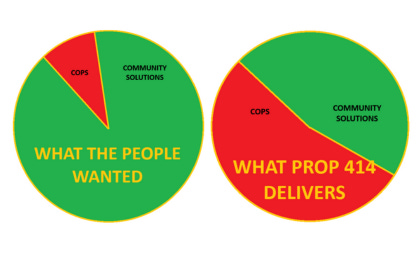

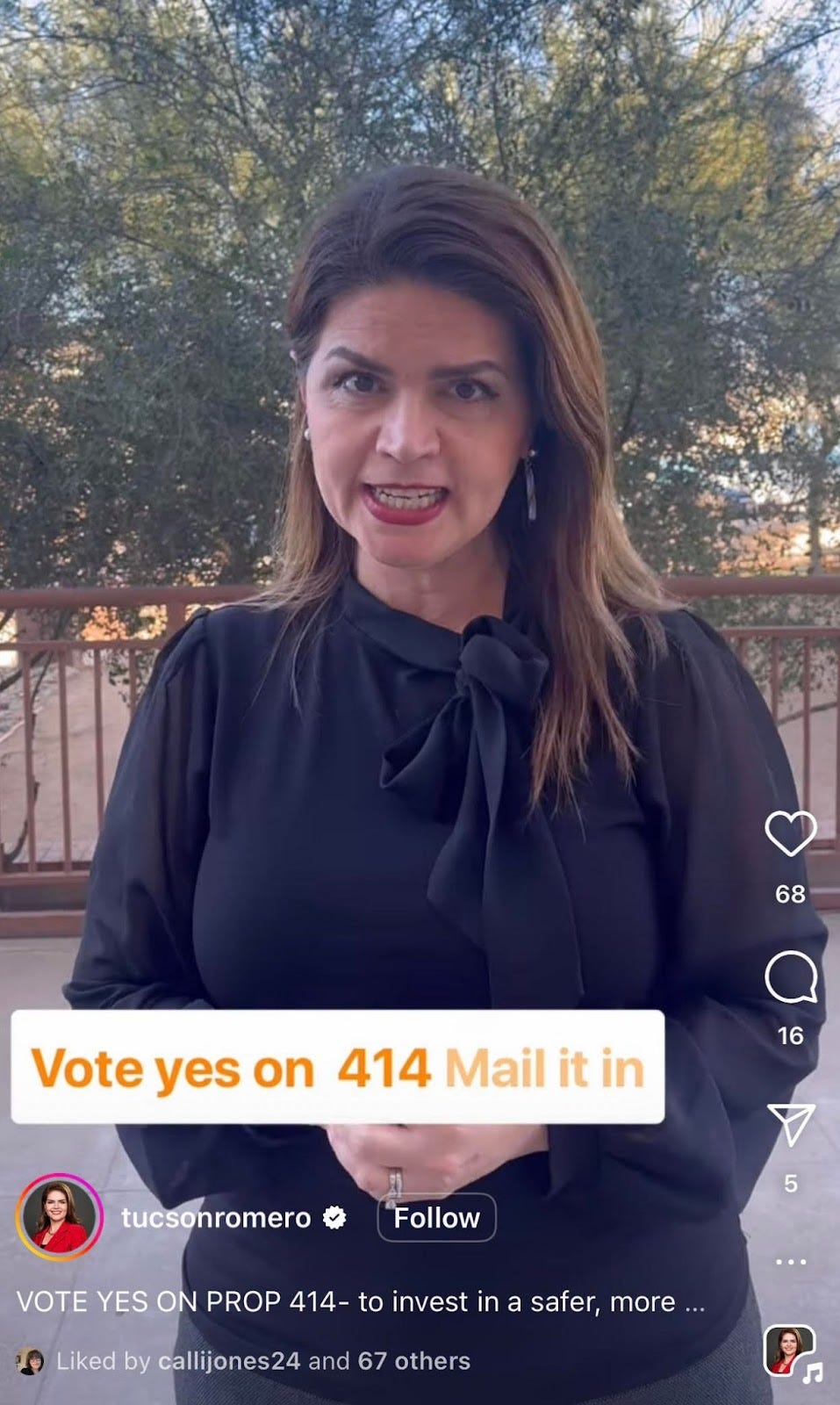
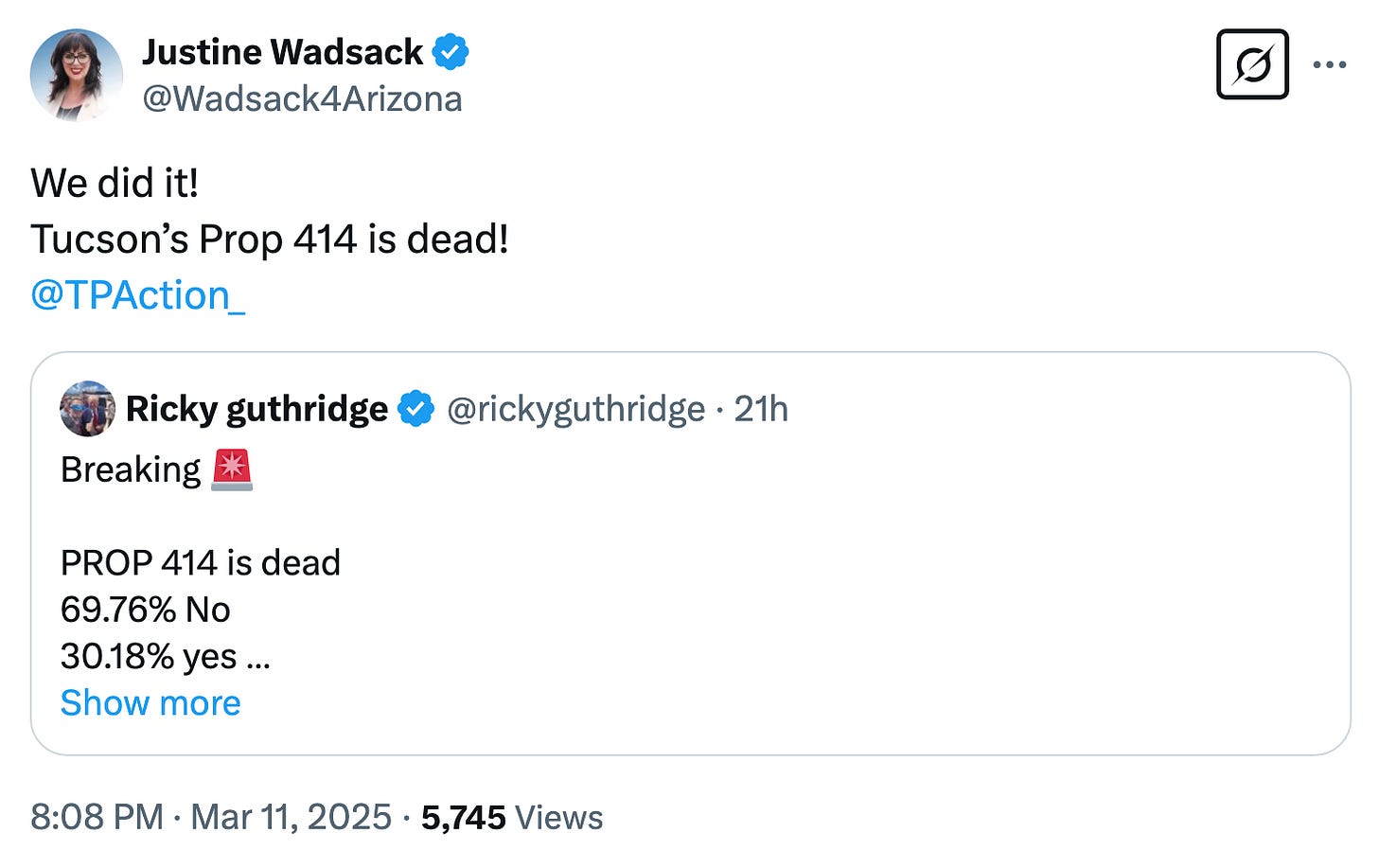
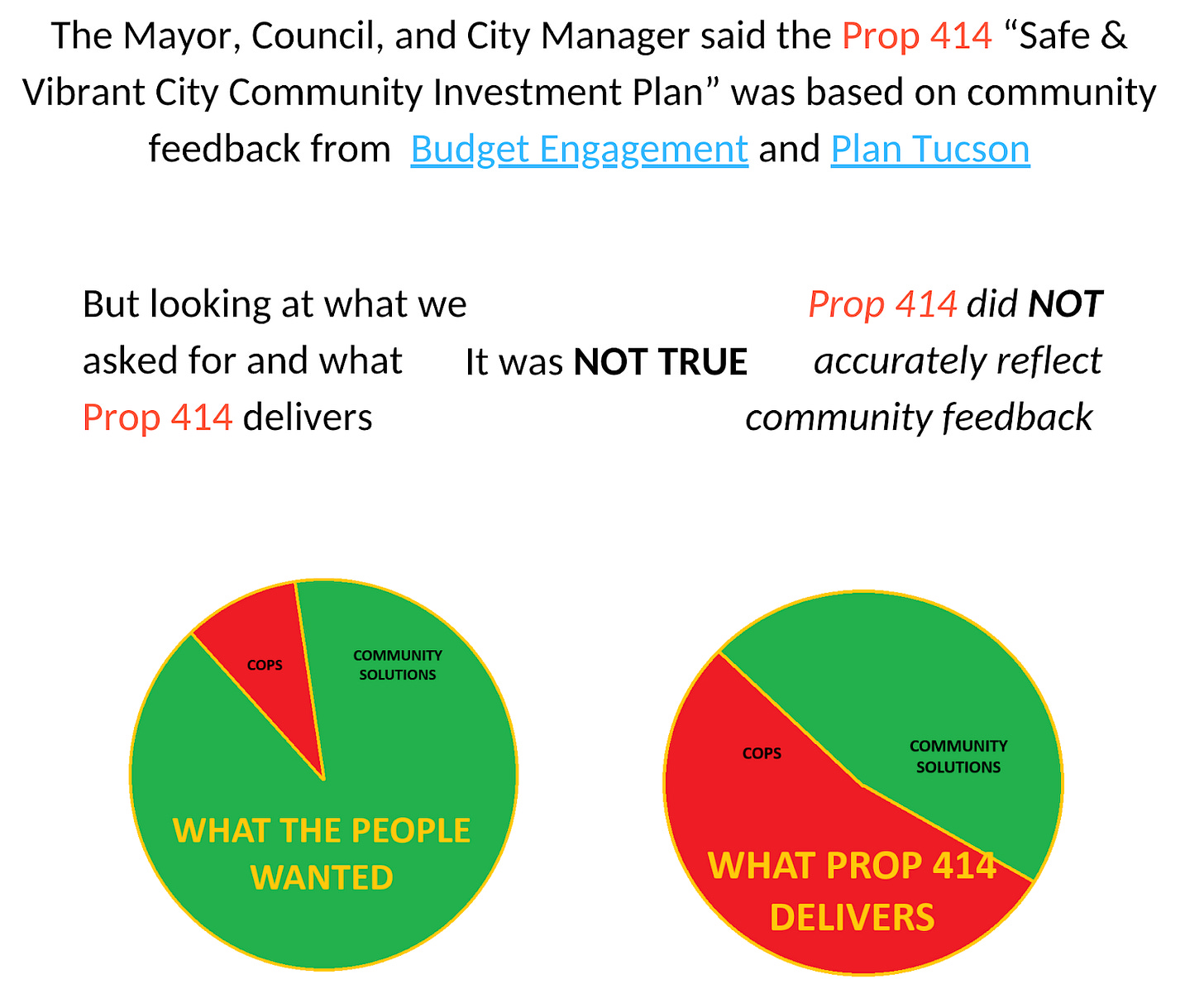
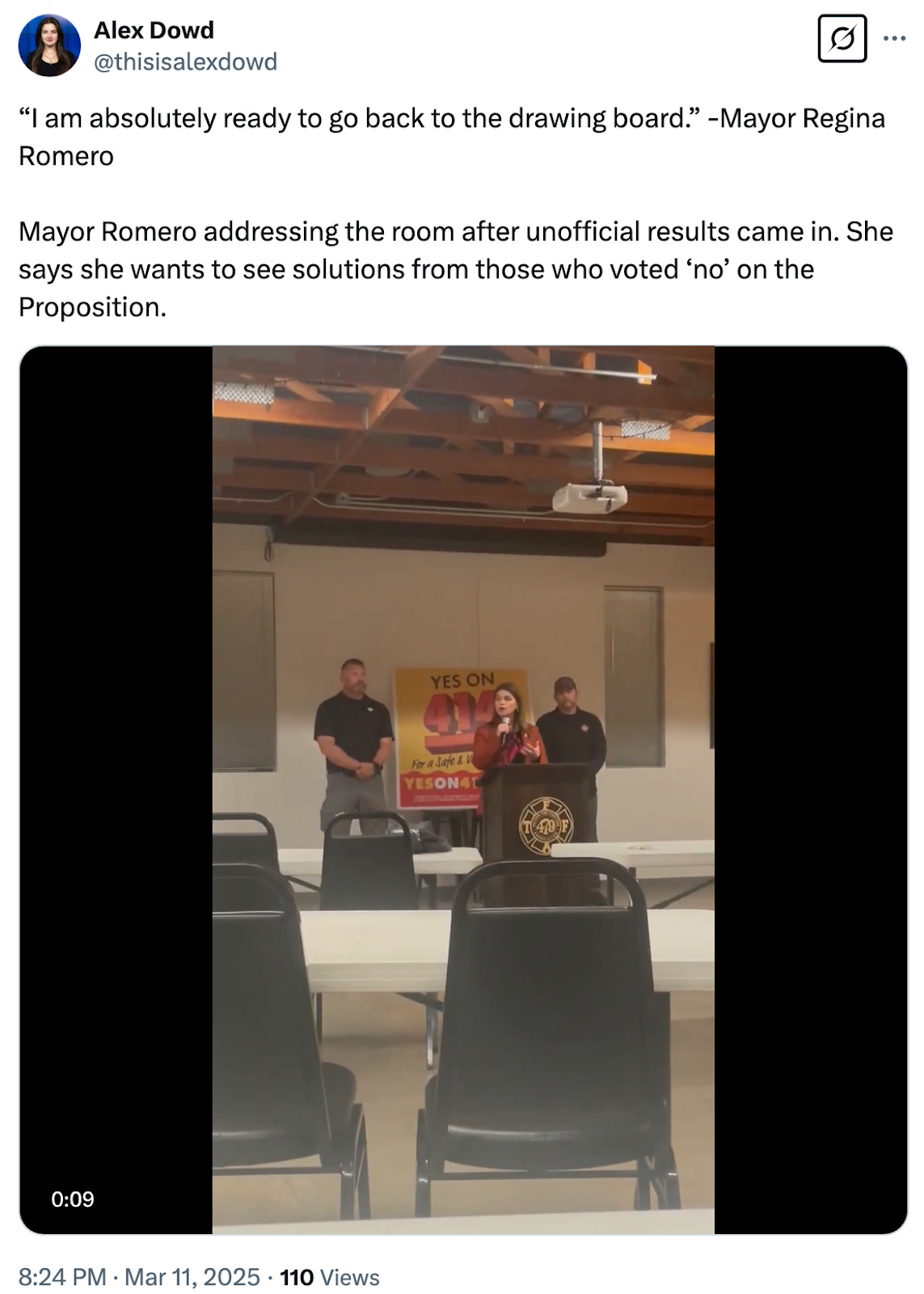

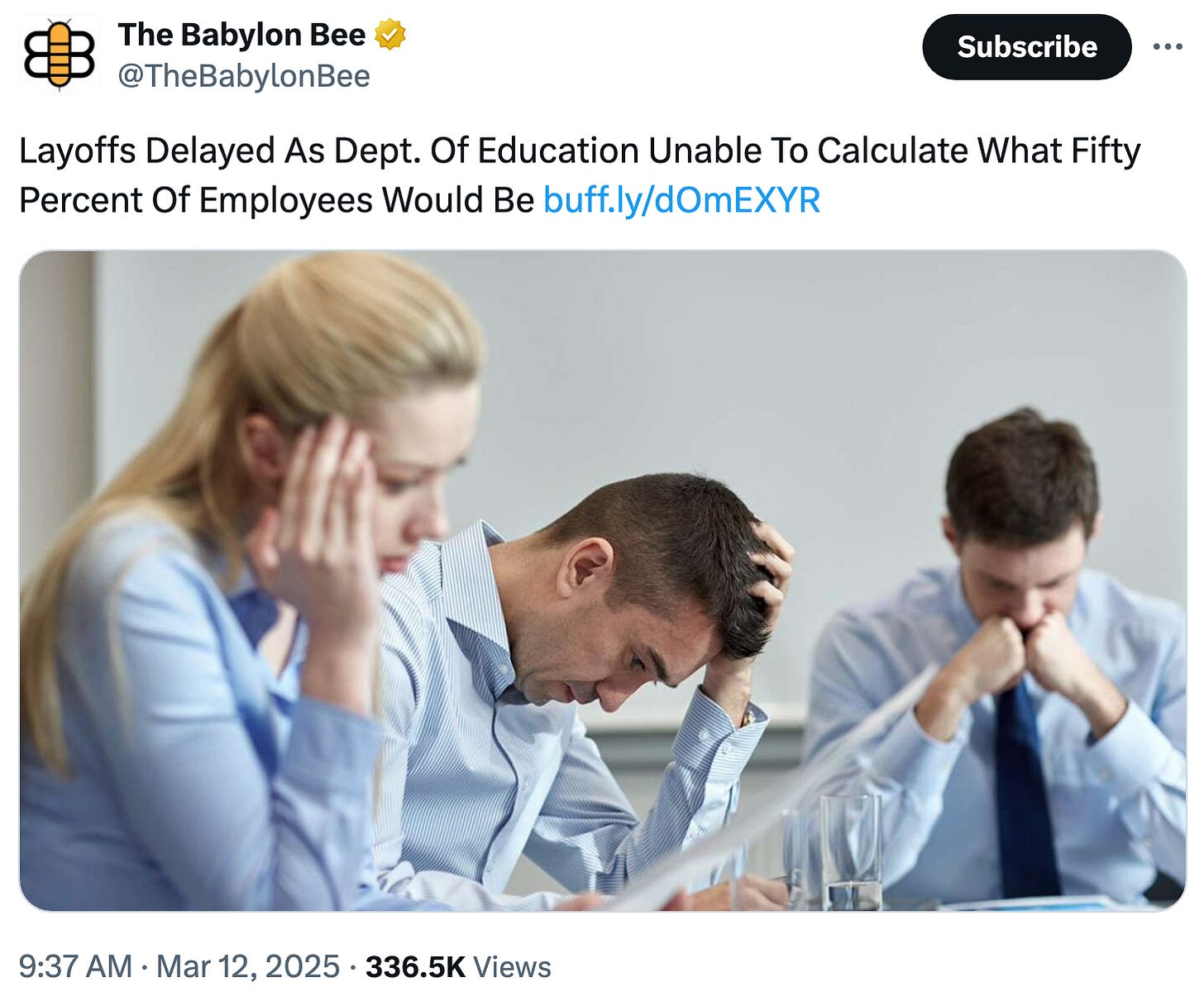

"So vote republican" is not the answer whatsoever. So work for another system with better candidates and better choices. The pay thing is hard in my mind. Agreed that the current salary limits the job to people with wealth or who still live with their parents, almost, but i will be damned if i want to pay mark finchem another dime!
You guys really are a great way to start the day! Everyone is wondering about prop 414 and i appreciate you pairing it with the TEP proposition to show how off base our politicians are. Partially we elect them because they are a part of a tight and powerful political machine that is very hard to break through and their historical opposition has its own problems. Partially 414 bombed through bad timing-- kitchentable economic issues that they did not foresee ( where do THEY eat breakfast one wonders?!). But mostly your circle chart shows it all. People said homelessness, they said cops. Turning Pt can take all the credit they want but i believe it was the other NO crowd that pulled it down. You know, those people who get systematically politically marginalized and whose solutions are ignored because they believe in feeding people. Proposing more surveillance in the age of the Great Deportation was just untenable to a broad spectrum of us.
And as for the laughter you could add in the example of protesters who showed up for months on end in front of our council demanding a resolution for a ceasefire in palestine ( in a raytheon town mind you so yes it WAS city business) and basically being told " lets stop this discussion-- its too controversial and people won't like us if we vote on it" is neither an appropriate, professional or even politically savvy way to end calls to the audience.